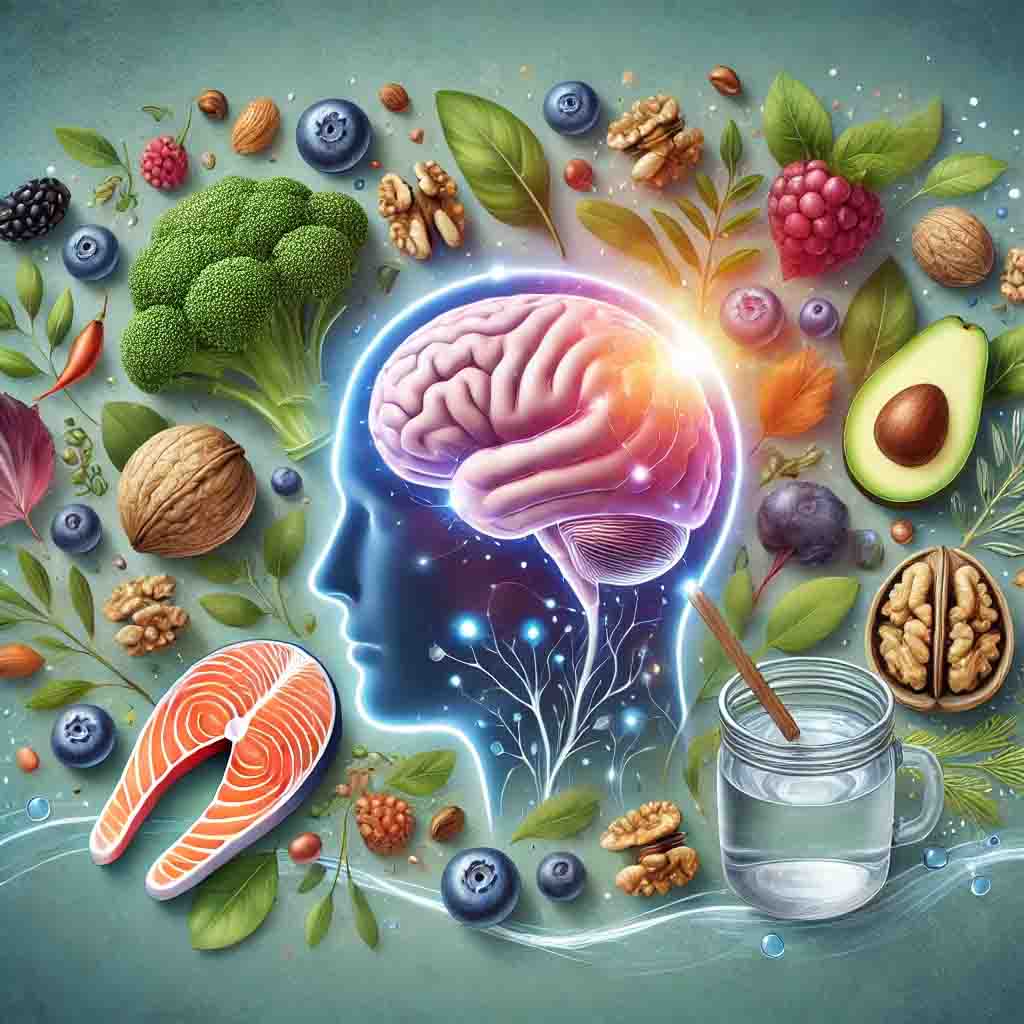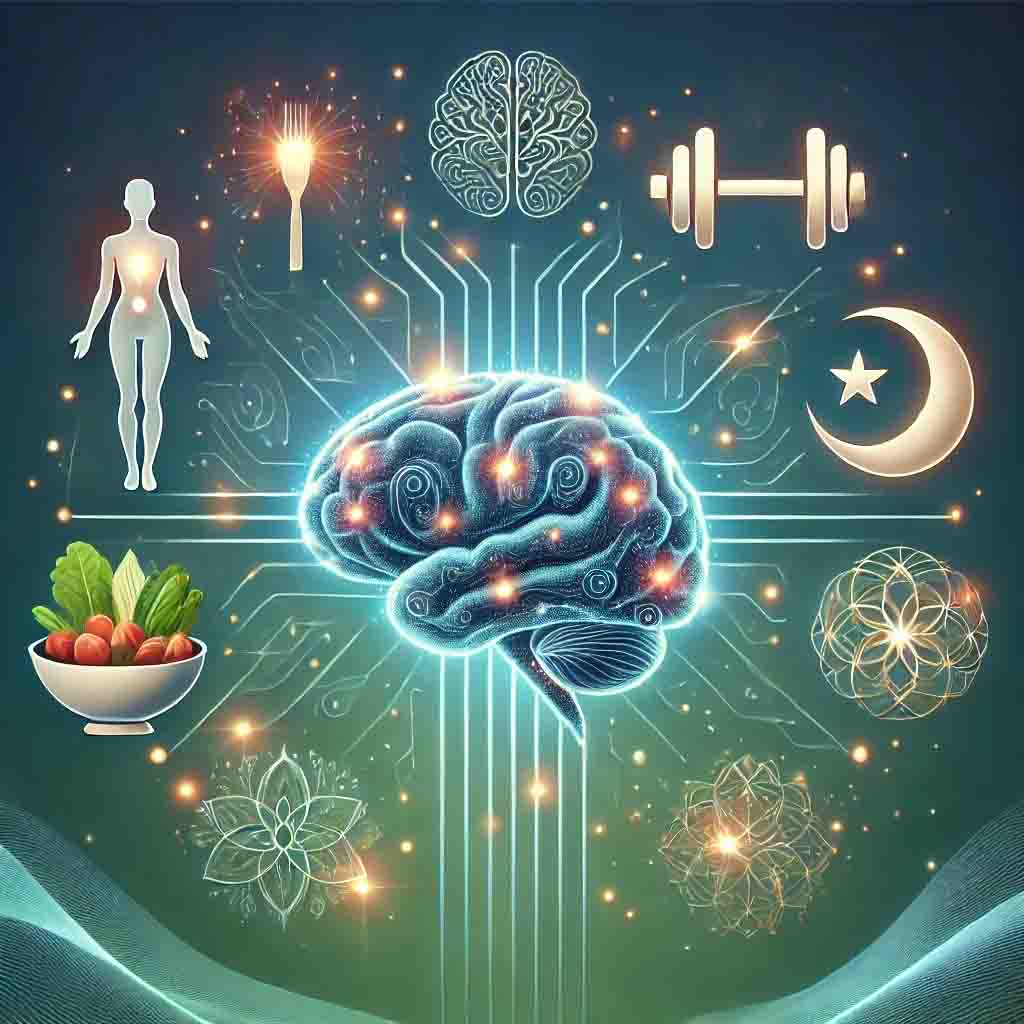Boosting Brain Power: Strategies for Peak Mental Performance
I never really thought about boosting brain power or the importance of cognitive health in general until I reached my late 30s. It was a wake-up call when I started forgetting simple things, like where I’d placed my keys or what I’d eaten for breakfast. The experience was frustrating, to say the least. Did you know that by 2050, the number of people living with dementia is projected to triple? It’s a concerning statistic, but there’s good news: we can take proactive steps to maintain and enhance our cognitive function.
Our brains are remarkably adaptable, and there are numerous ways to improve mental performance and maintain cognitive health as we age. In this guide, I’ll share the strategies I’ve learned over the years to boost brain power and maintain cognitive health. It’s not just about doing crossword puzzles (though they can be beneficial). We’ll cover a range of topics, from nutrition and exercise to sleep optimization and stress management. Let’s embark on this journey to give your brain the attention it deserves!
Understanding Cognitive Function
Cognitive function is like a multifaceted tool for your brain, encompassing various abilities that help you think, learn, and remember. These include memory, attention, processing speed, and several other complex mental processes. When I first delved into this subject, I was amazed by the intricacy of our cognitive abilities. It’s not just one uniform mass of gray matter doing all the work.
Each part of your brain has specific functions, and they work in concert to keep you functioning optimally. The fascinating aspect is that your brain is similar to a muscle in many ways. The more you use it, the stronger it becomes. This concept is known as neuroplasticity, and it’s essentially your brain’s capacity for growth and change. It means that regardless of your age, you can always work on improving your cognitive function. However, it’s important to note that numerous factors can impact your cognitive performance.
Stress, insufficient sleep, poor diet, and lack of mental stimulation can all take a toll. I learned this lesson the hard way during my college years when I frequently pulled all-nighters. Trust me, your brain doesn’t appreciate that kind of treatment!
Nutrition for Brain Health

For a long time, I assumed that as long as I wasn’t hungry, my brain was getting all the nutrients it needed. I couldn’t have been more mistaken. As it turns out, the brain is quite particular about its nutritional requirements – it needs specific nutrients to function optimally. I once experimented with an extremely unhealthy diet (it was part of a misguided challenge). After just a week, I felt as though my brain was enveloped in a fog. My ability to focus was compromised, my memory suffered, and my mood was noticeably affected.
Remembering this experience really drove home the significant impact of diet on brain function. So, what does our brain actually require? The key nutrients include omega-3 fatty acids, antioxidants, and various vitamins. Foods like fatty fish, blueberries, nuts, and dark leafy greens are particularly beneficial for brain health. And let’s not forget about hydration!
Here’s a practical tip: try incorporating a “brain-friendly” food into each meal. I began adding nuts to my morning oatmeal and including a side of broccoli with dinner. While it’s not a miraculous solution, I did notice a gradual improvement in my mental clarity over time. Just remember, moderation is key – consuming excessive amounts of any single food won’t lead to instant cognitive enhancement.
Boosting Brain Power with Physical Exercise
For many years, I viewed exercise primarily as a means to maintain physical fitness or manage weight. I had no idea how beneficial it could be for cognitive function. It turns out that engaging in physical activity is like giving your brain a rejuvenating treatment. I can recall the first time I went for a run after a long period of inactivity. While the physical exertion was challenging, the mental clarity I experienced afterward was remarkable. It felt as though a veil had been lifted from my mind.
Here’s what happens: exercise increases blood flow to your brain, delivering more oxygen and nutrients. It’s akin to providing your brain with an energy boost. Moreover, physical activity stimulates the growth of new brain cells, which is quite remarkable. The good news is that you don’t need to become an elite athlete to reap these benefits. Even a brisk 30-minute walk can have significant positive effects. Start with 15 minutes of walking daily and gradually increase the duration and intensity.
These days, I incorporate a mix of activities, including strength training and yoga. The key is to find physical activities that you enjoy. I experimented with various forms of exercise before discovering that hiking suited me best. Living in Vilcabamba provided all kinds of terrain to hike. From Mandango mountain to Podocarpus National Park, hiking in this area of Ecuador will never be boring. Not only do I get the physical benefits, but being in nature provides an additional boost to my mental well-being. It’s a win-win situation.
Excited to learn more about optimizing your physical health? Check out my detailed guide, “Mastering Physical Wellness: The Ultimate Health Guide” where I break down meal planning, effective workout routines, and the secrets to restorative sleep.
Sleep Optimization for Mental Performance

For a long time, I subscribed to the notion that sleep was a luxury I could ill afford. I would often work late into the night, catch up on tasks, or indulge in entertainment, thinking I was being productive. However, the consequences of this lifestyle eventually catch up with you. I found myself constantly fatigued, forgetful, and irritable. It was then that I truly understood the crucial role of sleep in cognitive function. Sleep acts as a restorative process for our brains, clearing out cellular debris and consolidating memories.
Without adequate sleep, your brain essentially tries to function in a state of disarray. I began experimenting with different sleep routines to find what worked best for me. Initially, I tried going to bed extremely early, but this led to restlessness. Then, I attempted an unconventional polyphasic sleep schedule I had read about online – which turned out to be a significant mistake. I ended up more exhausted than ever.
Eventually, I discovered a routine that suited me: a consistent sleep schedule (even on weekends), a cool, dark sleeping environment, and avoiding screens for at least an hour before bedtime. I also invested in a decent mattress, which made a noticeable difference in my sleep quality. One particularly helpful strategy could be to track your sleep patterns using a smartwatch. It was enlightening to see the actual quantity and quality of sleep I was getting. Now, I aim for 7-8 hours of sleep per night, and the improvement in my cognitive function has been remarkable.
Stress Management and Mental Clarity
Let’s address one of the most significant challenges to cognitive function: stress. For a long time, I wore my stress levels as a badge of honor, equating it with productivity and importance. However, I came to realize that chronic stress was actually hampering my cognitive abilities. I vividly remember an incident where I was so overwhelmed with stress about a work project that I completely froze during the presentation. It was as if my mind had temporarily shut down. This experience was a wake-up call, prompting me to take stress management just a little more seriously. Managing stress is undoubtedly challenging, and it’s not something that can be achieved overnight.
That being said, I have found several strategies that have been particularly effective for me. Meditation, for instance, has been transformative, even though I was initially skeptical. I started with just five minutes a day and gradually increased to 20 minutes. It’s become a daily mental refresher for me. Another significant change was learning to set boundaries and say “no” when necessary. I used to take on every project and favor asked of me, but now I’m more selective. Surprisingly, this hasn’t led to any negative consequences, and my stress levels have decreased significantly. I’ve also found that physical activities can be great stress relievers. When I’m feeling overwhelmed, I will often take a short break and walk into town or take a quick walk along the river trail. These brief interludes help reset my mental state and provide a fresh perspective on challenging situations.
Cognitive Training and Brain Games

I must admit, I once dismissed brain games as being primarily for older adults concerned about cognitive decline. I couldn’t have been more mistaken. It turns out that engaging in mental exercises is just as crucial as physical exercise for maintaining overall health. I remember downloading my first brain training app with a somewhat skeptical attitude. To my surprise, I found the experience both challenging and enjoyable. Before long, I was regularly engaging with these mental exercises. However, it’s important to note that not all brain games are equally beneficial. Some are more entertaining than truly challenging.
The key is to find games that target different cognitive skills such as memory, problem-solving, and spatial awareness. That being said, you don’t necessarily need specialized apps to give your brain a workout. I’ve taken to solving the daily crossword puzzle in the online newspaper, finding it to be an excellent mental challenge. The Saturday puzzles, in particular, provide a formidable test of cognitive skills. One of my favorite methods for challenging my brain is learning new skills. Last year, I decided to learn Spanish. While I struggled initially, the process of learning and practicing provided a comprehensive mental workout.
Nootropics and Cognitive Enhancers

The realm of “smart drugs” and cognitive enhancers is a fascinating one. When I first encountered the concept of nootropics, it seemed almost like science fiction – the idea of substances that could enhance cognitive function was both intriguing and slightly unsettling . After a lot of research and consultation with a healthcare professional, I decided to cautiously explore some of the more common cognitive enhancers.
I started with well-known substances like caffeine and L-theanine. The safest way to get this combo is by drinking pure green tea which contains both caffeine and L-theanine. While I did experience some improvement in focus, the effects were subtle rather than dramatic. I then ventured into trying some of the more specialized nootropic supplements. Some of these did provide a noticeable boost in mental clarity and focus. Others, however, had little perceptible effect, which reinforced the importance of individual variability in response to these substances. Everyone’s brain chemistry is different and what may work for one individual may not work for another. It’s crucial to understand that while some cognitive enhancers can be beneficial, they are not miracle solutions.
I learned this lesson from a friend who attempted to use nootropics to compensate for a lack of sleep – the results were far from ideal. Regarding prescription cognitive enhancers, it’s important to emphasize that these should only be used under proper medical supervision and for diagnosed conditions. They carry potential risks and side effects that need to be carefully considered. My perspective on nootropics is that they can be a useful tool in a broader cognitive enhancement strategy, but they are not a substitute for fundamental healthy practices like adequate sleep, proper nutrition, and regular exercise. It’s essential to approach their use with caution, thorough research, and preferably under professional guidance.
Technology-Assisted Cognitive Enhancement
The intersection of technology and cognitive enhancement is a rapidly evolving field that offers exciting possibilities. When I first encountered concepts like brain-computer interfaces, it seemed like something out of a science fiction novel. The idea of directly connecting our brains to computers was both fascinating and slightly unnerving. As I delved deeper into the subject, I discovered the remarkable potential of these technologies. Neurofeedback, for instance, is a technique that’s akin to having a personal trainer for your brain.
Virtual and augmented reality represent another frontier in cognitive training. Initially, I acquired a VR headset from a friend primarily for entertainment purposes. However, I soon discovered a wealth of brain training applications in VR. Engaging with puzzles and cognitive challenges in a three-dimensional space provides a unique and immersive way to stimulate mental processes. It’s important to maintain a balanced perspective on these technologies. While they offer exciting possibilities, we shouldn’t lose sight of more traditional methods of cognitive enhancement. I’ve found that combining high-tech solutions with simpler tools can be particularly effective. For example, I use a meditation app that provides biofeedback through my smartphone’s sensors, allowing me to track my progress in achieving a calmer mental state.
One word of caution: it’s easy to get caught up in the excitement of new technologies. Sometimes, conventional methods are just as effective as their high-tech counterparts.
Social Engagement and Cognitive Health

For a considerable time, I underestimated the importance of social interaction for cognitive health. I had the misconception that I could maintain cognitive sharpness through solitary activities alone. I couldn’t have been more mistaken. Our brains, as it turns out, thrive on social engagement. I recall a period when I was working from home for an extended time, with minimal human interaction. I noticed a gradual decline in my mental acuity and overall mood. It wasn’t until a friend encouraged me to attend a local musical event that I realized how much my brain had been craving social stimulation. The experience was invigorating, and I felt a noticeable improvement in my cognitive function. Since then, I’ve made a concerted effort to maintain an active social life.
One particularly effective strategy I’ve found is to engage in a variety of social activities. Different types of social interactions challenge the brain in unique ways. For instance, engaging in a debate exercises different cognitive skills compared to collaborative problem-solving or creative group activities. Intergenerational connections can be especially beneficial. It’s important to note that the quality of social interactions often matters more than the quantity. Engaging in deep, meaningful conversations can be particularly beneficial for cognitive health. So, while digital communication has its place, it’s worthwhile to prioritize face-to-face interactions when possible.
Want to become a master of social connections? Check out my comprehensive guide, “The Art of Building Relationships: 7 Essential Tips,” where we’ll dive into advanced communication skills, conflict resolution, and creating lasting bonds.
Continuous Learning and Mental Stimulation
The concept of lifelong learning is crucial for maintaining cognitive health. For a long time, I harbored the misconception that formal education marked the end of my learning journey. I couldn’t have been more mistaken. I had a moment of realization while watching a quiz show and finding that I could only answer questions related to topics I had studied years ago. This experience served as a catalyst, prompting me to commit to continuous learning. Most recently, I have spent countless hours learning and mastering Search Engine Optimization. While the material was challenging, it was also incredibly stimulating. The experience of grappling with new concepts felt like a mental workout, reinvigorating my cognitive processes.
It’s worth noting that learning doesn’t always have to be formal or structured. I’ve found that acquiring new hobbies is an excellent way to keep my mind engaged. Several years ago, I took up gardening, which has not only provided a relaxing pastime but has also led me to learn about topics ranging from soil chemistry and plant biology to hydroponics. I even went as far to design and build my own hydroponic unit in the basement of our house that served us and friends with an amazing amount of various greens.
The key to effective continuous learning is to consistently challenge yourself. Whether it’s learning a new language, mastering a musical instrument, or even experimenting with new recipes, the act of pushing your boundaries is what keeps your mind sharp. Your brain thrives on novelty and challenge. Remember, the goal isn’t to become an expert in everything, but rather to maintain a curious and active mind. You might surprise yourself with hidden talents or unexpected interests along the way. The journey of lifelong learning is as rewarding as the knowledge gained.
Mindfulness and Meditation for Mental Clarity

I must confess that I was initially skeptical about the benefits of mindfulness and meditation. The idea of sitting still and attempting to clear my mind seemed impractical, especially given my tendency towards a busy, racing mind. However, during a particularly stressful period at work, when I was struggling with forgetfulness and irritability, a colleague suggested I try meditation. Feeling that I had little to lose, I decided to give it a try.
I began with a guided meditation app, starting with just five minutes a day. Those initial sessions felt challenging, with my mind constantly wandering. But even after those brief sessions, I noticed a subtle shift in my mental state – a sense of calm that I hadn’t experienced in a while. Encouraged by these small changes, I persevered with the practice, gradually increasing the duration of my sessions. It wasn’t always easy, and there are still days when focusing seems nearly impossible. However, over time, I began to notice significant changes.
My ability to concentrate at work improved, and I found myself responding to stress more effectively. While I wouldn’t describe meditation as a panacea, it has become an essential part of my routine for maintaining mental clarity. I’ve even created a dedicated space in my home for meditation, which helps me transition into the right mindset for practice. One piece of advice that was particularly helpful for me was to start small and be patient with myself. It’s unrealistic to expect to meditate for long periods right from the start.
Also, it’s important to understand that mind-wandering is a normal part of the process. The practice lies in noticing when your mind has wandered and gently bringing your focus back. It’s also worth noting that mindfulness isn’t limited to formal meditation sessions. I’ve begun to incorporate mindfulness into various aspects of my daily life – from mindful eating to mindful walking. These practices have helped me become more present and aware throughout my day, leading to improved focus and reduced stress levels.
One unexpected benefit I’ve discovered is how mindfulness has enhanced my ability to manage emotions. By practicing non-judgmental awareness, I’ve found it easier to respond to challenging situations rather than react impulsively. This has had a positive impact on both my personal and professional relationships.
Ready to take your emotional health to the next level? My post, “5 core components to Master Emotional Intelligence for Inner Peace and Personal Growth,” delves into advanced techniques for emotional regulation, stress management, and building unshakeable resilience.
While the benefits of mindfulness and meditation can be profound, it’s important to approach the practice with realistic expectations. It’s not about achieving a state of constant bliss or completely eliminating stress. Rather, it’s about developing a more balanced and resilient mind, capable of navigating life’s ups and downs with greater ease.
Environmental Factors and Cognitive Performance
I used to underestimate the impact of my environment on my cognitive function. However, I’ve come to realize that our surroundings play a crucial role in how well our brains perform. Creating an optimal workspace was a game-changer for me. I experimented with different setups until I found what worked best. Good lighting, a comfortable chair, and a clutter-free desk made a noticeable difference in my ability to focus and be productive.
I also discovered the profound impact of nature on cognitive function. After reading research on the benefits of green spaces, I made it a point to spend more time outdoors. Whether it’s taking a walk in a nearby park during lunch breaks or working near a window with a view of trees, I’ve found that exposure to nature helps refresh my mind and boost my creativity. Managing digital distractions has been another crucial aspect of optimizing my environment for better concentration. I installed apps to limit my social media usage and adopted the practice of “deep work” sessions, where I eliminate all potential interruptions for set periods.
These strategies have significantly improved my ability to focus and complete complex tasks. The quality of air in our environment is often overlooked, but I’ve found it to be important. After investing in an air purifier for my home office, I noticed an improvement in my alertness and overall cognitive performance. Lastly, I’ve learned to be mindful of noise levels. While some background noise can be beneficial, too much can be distracting. I now use noise-cancelling headphones when I need to concentrate in noisy environments.
Personalized Approaches to Cognitive Enhancement

Through my journey of cognitive enhancement, I’ve come to appreciate that there’s no one-size-fits-all approach. What works for one person may not work for another, and it’s crucial to tailor strategies to individual needs and preferences. I started by taking time to understand my own cognitive strengths and weaknesses. I took various online cognitive assessments and kept a journal to track my mental performance under different conditions.
This self-awareness helped me identify areas where I needed the most improvement and which strategies were most effective for me. Setting personal goals has been key in my cognitive enhancement journey. Whether it’s improving memory, enhancing problem-solving skills, or boosting creativity, having clear objectives has helped me stay motivated and measure my progress.
Experimenting with different combinations of strategies has been crucial. For instance, I found that combining regular exercise with mindfulness meditation works particularly well for me in managing stress and improving focus. However, it took time and patience to discover this effective combination. Lastly, I’ve learned to be flexible and adjust my approach as needed. As my lifestyle and circumstances change, so do my cognitive needs. Regularly reassessing and tweaking my cognitive enhancement strategies has helped me maintain consistent progress.
Future Trends in Cognitive Enhancement
As I’ve delved deeper into the world of cognitive enhancement, I’ve become fascinated by the emerging technologies and research in this field. The future of cognitive enhancement looks both exciting and thought-provoking. One area that particularly intrigues me is the development of more sophisticated brain-computer interfaces. The potential for direct communication between our brains and external devices could revolutionize how we process and interact with information. Advances in personalized medicine are also promising for cognitive health.
The idea of treatments tailored to individual genetic profiles could lead to more effective interventions for cognitive decline and enhancement. However, as these technologies advance, it’s crucial to consider the ethical implications. I’ve spent time reflecting on questions such as: At what point does cognitive enhancement become unfair advantage? How do we ensure equal access to these technologies?
The potential societal impacts of widespread cognitive enhancement are profound. It could lead to increased productivity and innovation, but also widen existing social and economic gaps if not managed carefully. As we look to the future, I believe it’s important to approach cognitive enhancement with a balance of enthusiasm and caution. While embracing the potential benefits, we must also be mindful of the challenges and ethical considerations that come with these advancements.
Conclusion
As we’ve explored throughout this guide, boosting brain power and achieving peak mental performance is a multifaceted endeavor. From nutrition and exercise to sleep optimization and stress management, each aspect plays a crucial role in our cognitive health. I encourage you to take the strategies I’ve discussed and adapt them to your personal needs and lifestyle. Remember, what works best for you may be different from what works for others. Be patient with yourself and willing to experiment to find your optimal cognitive enhancement routine.
It’s important to approach cognitive enhancement holistically. While individual strategies can be effective, the real power lies in combining multiple approaches. Consider how you can integrate nutrition, exercise, mental stimulation, and stress management into your daily life in a sustainable way. As we look to the future, the field of cognitive enhancement continues to evolve with exciting new possibilities. However, the fundamental principles of brain health – including a healthy diet, regular exercise, quality sleep, and mental stimulation – remain crucial.
I encourage you to start your cognitive enhancement journey today. Even small changes can lead to significant improvements over time. Share your experiences and learn from others – cognitive health is a journey we’re all on together. Remember, our brains are remarkably adaptable at any age. With consistent effort and the right strategies, we all have the potential to enhance our cognitive abilities and maintain mental sharpness throughout our lives. Here’s to your brain health and peak mental performance!







